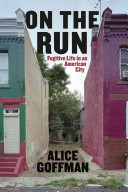2018 School Spending Survey Report
On the Run: Fugitive Life in an American City
Univ. of Chicago. 2014. 288p. notes. ISBN 9780226136714. $25; ebk. ISBN 9780226136851. SOC SCI
COPY ISBN
VERDICT This is an academic book that will appeal to general readers.
RELATED
ALREADY A SUBSCRIBER? LOG IN
We are currently offering this content for free. Sign up now to activate your personal profile, where you can save articles for future viewing




Comment Policy:
Comment should not be empty !!!